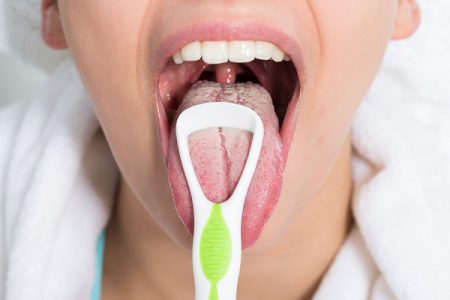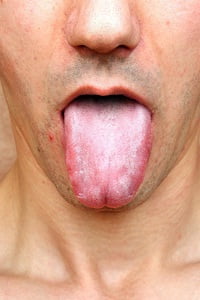Dry Mouth in Early Stage Pregnancy
- Updated on: Jun 10, 2024
- 5 min Read
- Published on Feb 12, 2020

Dry mouth or xerostomia is one of the common symptoms in early pregnancy. It mostly occurs due to various hormonal changes that occur during early pregnancy and ultimately lead to several chemical changes.
Women who are in the first trimester of pregnancy mostly experience the symptoms of dry mouth syndrome. During pregnancy, women need a lot of water for the developing fetus which causes dry mouth. Read more about causes of dry mouth
The symptoms of dry mouth in pregnant women mostly appear during the night.
What are the Symptoms of Dry Mouth in Early Pregnancy?
Women with the dry mouth during pregnancy often experience the following symptoms:
- Problems in digestion (indigestion)
- Hot flashes
- Change in taste
- Trouble in speaking due to lack of moisture in the mouth
- Dry nose
- Sore throat
- Hoarseness
- Burning feeling in the mouth
- Dental problems like tooth decay
- Burning sensation in the throat
- Cracked lips
- Headaches
What Causes Dry Mouth During Pregnancy?
Almost all women experience dry mouth symptoms during pregnancy especially during the early stage pregnancy (first trimester).
Following are some of the potential causes of dry mouth in early-stage pregnancy:
Gestational Diabetes
Some women during pregnancy suffer from temporary diabetes called gestational diabetes which goes away after the childbirth.
During gestational diabetes, there is an increase in the blood sugar levels as the body is unable to produce sufficient insulin. High blood sugar levels result in extreme thirst, frequent urination, and fatigue which contribute to the symptoms of dry mouth.
Side Effects of Drugs
During pregnancy, some women have to take various drugs like antidepressants, bronchodilators, diuretics, etc.
These drugs may lead to various side effects like dry mouth which becomes sometimes very annoying, but you should not stop these medications without a doctor’s suggestion.
Increase in Blood Volume
During pregnancy, women often experience an increase in the amount of blood flow with its peak volume almost higher than in a non-pregnant woman. Due to this increased blood volume, the kidneys work more actively which in turn results in frequent urination and dehydration, all this ultimately results in dry mouth.
Dehydration
Increased blood flow in pregnancy results in dehydration in women and even taking normal regular eight glasses of water doesn’t quench their thirst.
Pregnant women often feel dehydrated due to frequent urination which results in dry mouth.
High Metabolic Rate
Pregnancy increases the rate of various cellular and metabolic processes in the body such as energy production, breaking down the food, etc. As a result, the body consumes the water present in the body, which should be replenished regularly.
Due to excess consumption of water in the body and loss of water in the form of urine, the water in the body is not replenished due to which the women feel a dry mouth.
Thrush
An overgrowth of a fungus “Candida albicans” in our mouth is called thrush. Normally, everyone has some growth of this fungus in mouth but if there is any abnormality in our immune system, this fungus grows out of range which results in increased thrush.
Some women experience immune-related issues in pregnancy and therefore develop oral thrush. This oral thrush causes dry mouth in such women with a cottony feeling in their mouths.
Sleep-Related Issues and Breathing Problems
Pregnant women often suffer from sleep-related issues like sleeplessness and breathing problems like sleep apnea and snoring.
Snoring and sleep apnea can make you breathe with open mouth during sleeping. This open mouth breathing reduces the saliva production which causes dry mouth.
Changes in Hormone Levels
The fluctuating hormone levels during pregnancy may also reduce the production of saliva which causes dry mouth.
More: When is there need to visit an emergency dentist?
Vomiting
Vomiting and nausea are very common in pregnant women. Vomiting results in fluid loss from the body and creates an acidic environment in the mouth. If the saliva in the mouth is not enough to flush out the acidic fluids, it may result in dry mouth.
Lifestyle Changes
Some life-style changes during pregnancy like alcohol consumption, cigarette smoking, using tobacco products, drinking caffeine-containing beverages, having spicy foods, and mouth breathing may also cause dry mouth.
Anxiety in pregnancy is also found to relate to dry mouth. Read about the association between anxiety and dry mouth here.
Some Tips for Dealing With Dry Mouth in Early Pregnancy
Dry mouth is a common symptom in early pregnancy especially in the first trimester and can be managed by following the below-mentioned tips:
- Drink plenty of fluids
- Keep your mouth wet by sucking some pieces of ice or chewing some sugarless gums
- Avoid mouth breathing during sleeping and attempt nose breathing to avoid the evaporation of water through the mouth which causes dry mouth
- Prevent your nasal dryness by inhaling steam
- Avoid things that may result in dehydration
- Avoid alcohol consumption
- Avoid smoking which may worsen your symptoms of dry mouth during pregnancy
- Use chewing gums (sugar-free) as they may increase your saliva production and prevent dry mouth
- Maintain good oral hygiene as it may prevent oral thrush
- Drink coconut water (rich in vitamins and minerals) as it may balance buffers in your blood
- Avoid foods that are rich in sodium because they may result in water loss from the body leading to dry mouth
- Use a humidifier for preventing your dry mouth especially during the night
- Avoid mouthwashes containing alcohol
- Avoid drinks that may increase your thirst such as tea, coffee, and aerated drinks
More: What is halitosis (bad breath)?
Is Dry Mouth Risky During Pregnancy? When Should You Consult a Doctor?
Dry mouth is very common during pregnancy especially in the early stages and it is not risky because pregnancy is associated with various hormonal and metabolic changes in the body which causes dry mouth.
There are different ways by which you can manage your dry mouth symptoms; however, you should visit a doctor for your dry mouth under certain conditions especially if you are unable to manage your symptoms.
Following are the conditions under which you should visit a doctor:
- If you have oral thrush followed by cheese-like white lesions, soreness, and redness in your mouth
- If you feel excessive thirst, frequent urination, and fatigue due to gestational diabetes
- If you face dental problems like severe toothache, tooth decay, and black or brown spots on your teeth
- If your sleep apnea symptoms become worse
- If you face severe dehydration
FAQs
How Early in Pregnancy Do You Get Dry Mouth?
Dry mouth usually starts at the beginning of pregnancy especially in the first or second trimester of pregnancy during which women face a lot of difficulties like difficulty in swallowing, problem, in speaking, sore throat, and breathing difficulties.
Why is my Mouth Dry Even Though I Drink a Lot of Water?
Dry mouth or Xerostomia is caused due to various hormonal and metabolic changes that occur in the body during pregnancy. Pregnant women often suffer from gestational diabetes and some other hormonal changes due to which they lose excess water from the body in the form of urine which causes dry mouth even if they drink plenty of fluids.
Is Dry Mouth Dangerous?
Any person can have dry mouth at least once in a lifetime. People who are upset or stress often feel dry mouth. Dry mouth occurs due to less saliva production and is not dangerous as such. However, if you have dry mouth persistently, it can make you feel uncomfortable and can result in serious health problems.
What Causes Severe Dry Mouth at Night?
Most people have dry mouth, especially in the night. The reason is sleep apnea or some kind of nasal obstruction due to which you are forced to breathe through your mouth instead of the nose. When you breathe through your mouth, it causes evaporation of the moisture in your mouth resulting in dry mouth.
Can Stress Cause Dry Mouth?
Yes, stress, anxiety, depression can often result in dry mouth. Some people suffer from chronic dry mouth even though their salivary glands are functioning normally.












